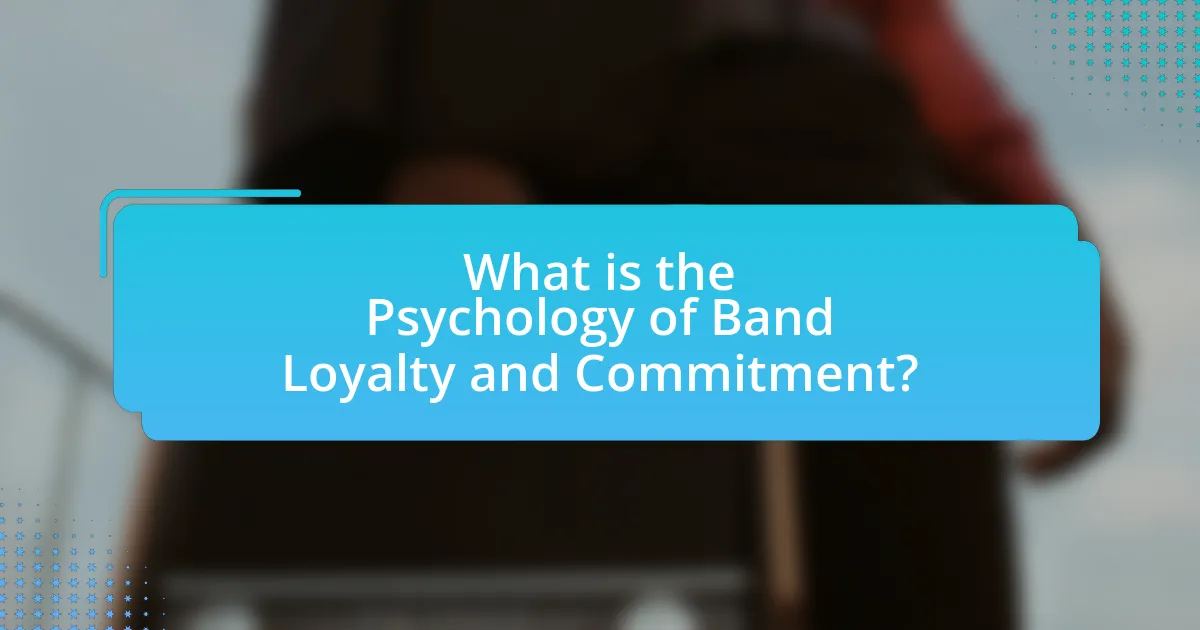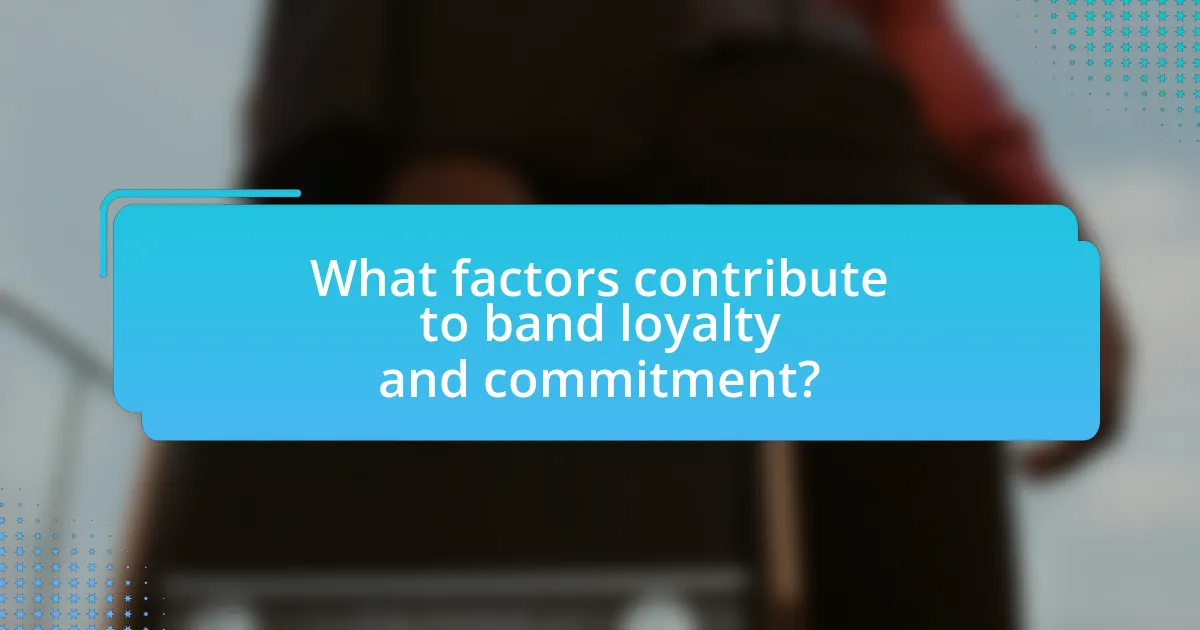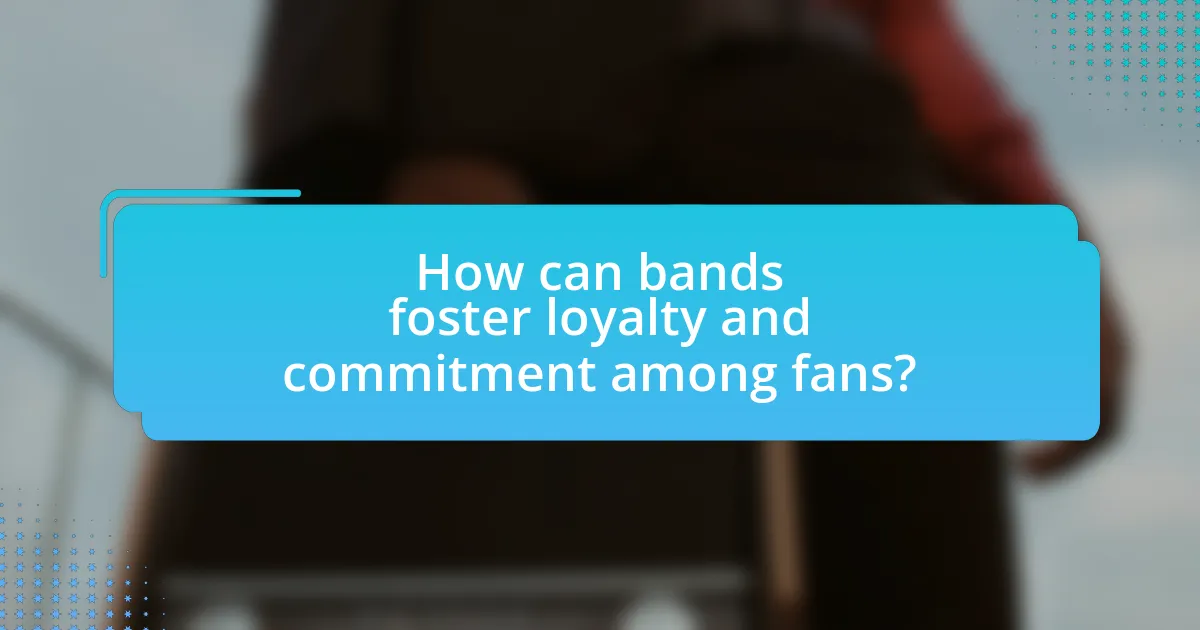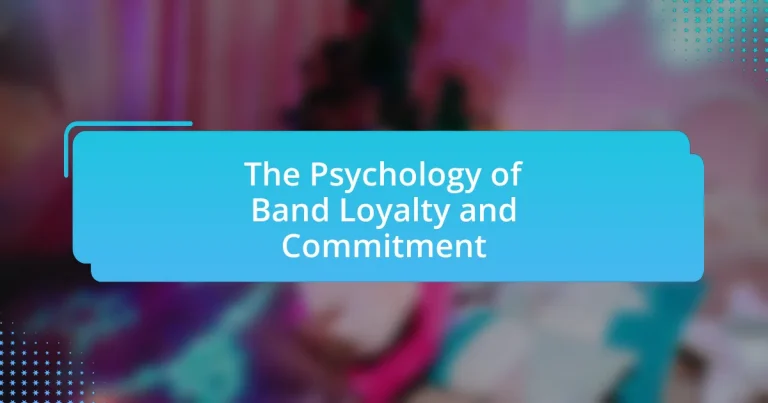The main entity of the article is the psychology of band loyalty and commitment, which explores the emotional and cognitive factors that drive individuals to consistently support specific music groups. The article examines how personal identity, social connections, and perceived authenticity influence fan loyalty, highlighting the importance of emotional connections and shared experiences in fostering commitment. It discusses the role of psychological theories, such as social identity theory and the theory of planned behavior, in understanding fan behavior and engagement. Additionally, the article outlines strategies for bands to enhance fan loyalty through effective communication, personalized experiences, and adapting to changing expectations, while also addressing common pitfalls to avoid in maintaining strong relationships with their audience.

What is the Psychology of Band Loyalty and Commitment?
The psychology of band loyalty and commitment refers to the emotional and cognitive factors that drive individuals to consistently support and engage with a particular music group. This loyalty is often influenced by personal identity, social connections, and the perceived authenticity of the band. Research indicates that fans develop strong attachments to bands through shared experiences, such as attending concerts and participating in fan communities, which reinforce their commitment. For instance, a study published in the Journal of Consumer Research by Thomson, MacInnis, and Park (2005) highlights how emotional connections and social identity significantly enhance consumer loyalty to brands, including music bands. This demonstrates that the psychological mechanisms behind band loyalty are deeply rooted in emotional engagement and social belonging.
How do psychological factors influence band loyalty?
Psychological factors significantly influence band loyalty by shaping emotional connections and personal identification with the band. Fans often develop a sense of belonging and community through shared experiences, which enhances their commitment to the band. Research indicates that emotional attachment, driven by factors such as nostalgia and personal relevance of the band’s music, fosters loyalty. For instance, a study published in the Journal of Consumer Research by Thomson, MacInnis, and Park (2005) found that emotional engagement with music can lead to stronger brand loyalty, as fans perceive the band as an integral part of their identity. This emotional bond encourages fans to support the band through purchases and attendance at events, reinforcing their loyalty over time.
What role does emotional connection play in band loyalty?
Emotional connection is crucial in fostering band loyalty, as it creates a sense of belonging and attachment among fans. When fans emotionally resonate with a band’s music, lyrics, or persona, they are more likely to develop a strong, lasting commitment to that band. Research indicates that emotional engagement can lead to increased fan behaviors, such as attending concerts and purchasing merchandise, which are essential for a band’s success. For instance, a study published in the Journal of Consumer Research found that emotional connections significantly enhance consumer loyalty, demonstrating that fans who feel a personal connection to a band are more likely to remain loyal over time.
How does personal identity affect commitment to a band?
Personal identity significantly influences commitment to a band by shaping an individual’s emotional connection and sense of belonging. When fans identify with a band’s values, image, or music style, they are more likely to develop a strong loyalty, often viewing the band as an extension of their own identity. Research indicates that fans who see their personal experiences reflected in a band’s lyrics or themes are more committed, as this connection fosters a deeper emotional investment. For example, a study published in the Journal of Consumer Research found that individuals who align their self-concept with a band’s identity exhibit higher levels of engagement and support for the band, demonstrating that personal identity is a critical factor in fostering commitment.
Why is commitment important in the context of music fandom?
Commitment is important in the context of music fandom because it fosters a deep emotional connection between fans and artists, enhancing the overall experience of music consumption. This emotional bond often leads to increased loyalty, where fans actively support their favorite artists through concert attendance, merchandise purchases, and social media engagement. Research indicates that committed fans are more likely to participate in community-building activities, such as fan clubs or online forums, which further strengthens their connection to the music and the artist. Additionally, commitment can influence the longevity of an artist’s career, as dedicated fans contribute to sustained popularity and financial success through their unwavering support.
What are the long-term effects of band loyalty on fans?
The long-term effects of band loyalty on fans include enhanced emotional well-being, a sense of community, and sustained engagement with music culture. Fans who exhibit loyalty often experience increased happiness and fulfillment through their connection to the band, as studies indicate that strong emotional ties to music can lead to improved mental health outcomes. Additionally, loyal fans frequently participate in fan communities, fostering social connections that provide support and shared experiences. Research shows that these social bonds can lead to lasting friendships and a sense of belonging, which are crucial for psychological resilience. Furthermore, loyal fans tend to maintain their engagement with the band’s music and activities over time, contributing to a continuous cycle of support and interaction that reinforces their commitment.
How does commitment shape fan behavior and engagement?
Commitment significantly shapes fan behavior and engagement by fostering a deeper emotional connection to the band or artist. This emotional bond leads fans to exhibit loyalty, which manifests in consistent attendance at concerts, active participation in fan communities, and increased sharing of content related to the band. Research indicates that fans who feel a strong commitment are more likely to engage in behaviors such as purchasing merchandise and promoting the band on social media platforms. For instance, a study published in the Journal of Consumer Research found that emotional commitment enhances fans’ willingness to invest time and resources into supporting their favorite artists, thereby reinforcing their engagement and loyalty.

What factors contribute to band loyalty and commitment?
Factors contributing to band loyalty and commitment include emotional connection, consistent quality of music, and engagement with fans. Emotional connection arises when listeners identify with the band’s themes and values, fostering a sense of belonging. Consistent quality of music ensures that fans remain satisfied and eager for new releases, as evidenced by studies showing that artists with a strong discography maintain higher loyalty rates. Engagement with fans, through social media interactions and live performances, enhances the relationship between the band and its audience, leading to increased commitment. Research indicates that these elements collectively strengthen the bond between fans and bands, resulting in long-term loyalty.
How do social influences impact band loyalty?
Social influences significantly impact band loyalty by shaping fans’ perceptions and emotional connections to the band. When fans engage with their social circles, such as friends and family, their preferences and loyalty can be reinforced through shared experiences, discussions, and recommendations. Research indicates that social identity theory suggests individuals derive part of their self-concept from their group memberships, including music fandoms. This connection can lead to increased loyalty as fans feel a sense of belonging and community with others who share similar musical tastes. Additionally, social media platforms amplify these influences by allowing fans to interact, share content, and express their loyalty publicly, further solidifying their commitment to the band.
What role do peer groups play in shaping musical preferences?
Peer groups significantly influence musical preferences by providing social validation and exposure to diverse genres. Individuals often align their music tastes with those of their peers to foster social connections and acceptance. Research indicates that adolescents, in particular, are susceptible to peer influence, as they seek to establish their identities within social contexts. A study published in the Journal of Youth and Adolescence found that peer group dynamics can lead to shared musical interests, reinforcing group identity and cohesion. This social reinforcement shapes individual preferences, making music a key component of social interaction and belonging among peers.
How does social media affect fan engagement with bands?
Social media significantly enhances fan engagement with bands by providing direct communication channels and interactive platforms. Bands utilize social media to share updates, behind-the-scenes content, and personal messages, fostering a sense of connection and community among fans. Research indicates that 78% of fans feel more connected to their favorite artists through social media interactions, which can lead to increased loyalty and commitment. Additionally, platforms like Instagram and Twitter allow fans to engage in real-time discussions, share their experiences, and participate in promotional activities, further solidifying their emotional investment in the band.
What psychological theories explain band loyalty?
Psychological theories explaining band loyalty include social identity theory, which posits that individuals derive part of their self-concept from their membership in social groups, such as fan communities. This theory suggests that fans identify with a band, enhancing their sense of belonging and loyalty. Additionally, the mere exposure effect indicates that repeated exposure to a band’s music increases familiarity and preference, fostering loyalty over time. Research by Zajonc (1968) supports this, demonstrating that familiarity can lead to positive attitudes toward stimuli. Furthermore, the theory of planned behavior highlights how attitudes, subjective norms, and perceived behavioral control influence fans’ intentions to remain loyal to a band. This theory is supported by studies showing that positive attitudes toward a band correlate with stronger loyalty.
How does the Social Identity Theory relate to music fandom?
Social Identity Theory relates to music fandom by explaining how individuals identify with specific music groups, which fosters a sense of belonging and enhances self-esteem. This theory posits that people categorize themselves and others into social groups, and in the context of music, fans often align their identities with particular artists or genres. Research indicates that fans derive social identity from their affiliation with music groups, leading to in-group favoritism and a stronger emotional connection to the music and its community. For example, studies have shown that fans of a particular band often engage in behaviors that reinforce their group identity, such as attending concerts and participating in fan clubs, which further solidifies their loyalty and commitment to the band.
What insights does the Theory of Planned Behavior provide on fan commitment?
The Theory of Planned Behavior provides insights into fan commitment by highlighting the role of attitudes, subjective norms, and perceived behavioral control in influencing fans’ intentions to engage with a sports team or brand. This theory posits that positive attitudes towards a team, social pressures from peers, and the belief in one’s ability to participate significantly enhance commitment levels. Research indicates that fans who perceive strong social support and have favorable attitudes towards their team are more likely to demonstrate loyalty and consistent engagement, as evidenced by studies showing that these factors correlate with increased attendance and merchandise purchases.

How can bands foster loyalty and commitment among fans?
Bands can foster loyalty and commitment among fans by engaging them through consistent communication and exclusive experiences. By maintaining regular interaction via social media, newsletters, and fan clubs, bands create a sense of community and belonging. Exclusive content, such as behind-the-scenes footage, early access to tickets, and special merchandise, enhances fans’ emotional investment. Research indicates that emotional connections significantly influence loyalty; for instance, a study published in the Journal of Consumer Research found that consumers who feel a personal connection to a brand are more likely to remain loyal. Therefore, by prioritizing fan engagement and offering unique experiences, bands can effectively cultivate long-term loyalty and commitment.
What strategies can bands use to enhance fan engagement?
Bands can enhance fan engagement by utilizing social media platforms to create interactive content and foster direct communication with fans. Engaging fans through live Q&A sessions, behind-the-scenes content, and personalized messages can significantly increase their sense of connection to the band. Research indicates that 78% of fans feel more connected to artists who actively engage with them on social media, demonstrating the effectiveness of this strategy. Additionally, hosting exclusive events, such as meet-and-greets or fan club gatherings, can further deepen the relationship between bands and their audience, reinforcing loyalty and commitment.
How can bands create meaningful experiences for their fans?
Bands can create meaningful experiences for their fans by engaging them through interactive performances, personalized communication, and exclusive content. Interactive performances, such as allowing fans to participate in songs or share their stories, foster a sense of community and belonging. Personalized communication, including addressing fans by name in social media interactions or sending tailored messages, enhances emotional connections. Exclusive content, like behind-the-scenes footage or early access to new music, makes fans feel valued and part of the band’s journey. Research indicates that emotional engagement significantly increases fan loyalty, as demonstrated by a study published in the Journal of Consumer Research, which found that fans who feel a personal connection to a band are more likely to support them financially and attend live events.
What role does communication play in building fan loyalty?
Communication is essential in building fan loyalty as it fosters a sense of connection and engagement between fans and the brand. Effective communication strategies, such as personalized messaging and active social media interaction, create a community where fans feel valued and heard. Research indicates that brands that maintain open lines of communication with their audience see a 20% increase in customer retention rates, demonstrating that consistent engagement enhances loyalty. By addressing fan concerns and celebrating their contributions, brands can strengthen emotional ties, leading to long-term commitment and advocacy.
What are the best practices for maintaining fan loyalty over time?
To maintain fan loyalty over time, organizations should prioritize consistent engagement, personalized experiences, and transparent communication. Consistent engagement through regular updates, events, and interactions keeps fans connected and invested. Personalized experiences, such as tailored content and exclusive offers, enhance the emotional bond between fans and the brand. Transparent communication fosters trust, as fans appreciate honesty regarding changes or challenges. Research indicates that brands that effectively engage with their audience can see loyalty increase by up to 30%, demonstrating the importance of these practices in cultivating long-term commitment.
How can bands adapt to changing fan expectations?
Bands can adapt to changing fan expectations by actively engaging with their audience through social media and live interactions. This engagement allows bands to gather real-time feedback and understand the evolving preferences of their fans. For instance, a study by the University of Southern California found that artists who interact with fans on platforms like Instagram and Twitter see a 30% increase in fan loyalty, as fans feel more connected to the artists. Additionally, bands can diversify their music styles and incorporate elements that resonate with current trends, ensuring they remain relevant. By analyzing streaming data and audience demographics, bands can tailor their content to meet the specific desires of their fan base, thereby enhancing their commitment and loyalty.
What common pitfalls should bands avoid in their relationship with fans?
Bands should avoid neglecting fan engagement, as this can lead to a disconnect and loss of loyalty. When bands fail to interact with their fans through social media, live events, or personal messages, they risk alienating their audience. Research indicates that consistent communication fosters a sense of community and belonging among fans, which is crucial for maintaining loyalty. For instance, a study published in the Journal of Music Marketing found that bands with active social media presence saw a 30% increase in fan engagement compared to those who were less interactive. Therefore, neglecting this aspect can significantly diminish a band’s relationship with its fanbase.
What practical tips can bands implement to strengthen fan commitment?
Bands can strengthen fan commitment by actively engaging with their audience through social media, personalized communication, and exclusive content. Engaging on platforms like Instagram and Twitter allows bands to create a sense of community, where fans feel valued and connected. Personalized communication, such as responding to fan messages or acknowledging their contributions, fosters loyalty by making fans feel recognized. Additionally, offering exclusive content, such as behind-the-scenes footage or early access to tickets, enhances the fan experience and encourages deeper emotional investment. Research shows that emotional connections significantly influence loyalty, with fans more likely to remain committed when they feel a personal bond with the band.

















